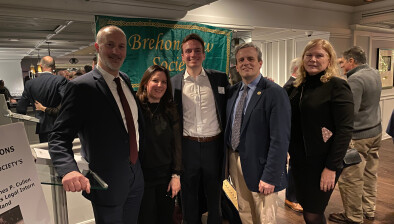NI Court of Appeal: Law Society appeal against Solicitors’ Disciplinary Tribunal decision dismissed

Northern Ireland’s Court of Appeal has dismissed an appeal by the Law Society of Northern Ireland against a decision of the Solicitors’ Disciplinary Tribunal concerning allegations including the non-production of documents on behalf of a legal firm.

About this case:
- Citation:[2024] NICA 57
- Judgment:
- Court:NI Court of Appeal
- Judge:Lady Chief Justice Siobhan Keegan
Delivering judgment for the Court of Appeal, Lady Chief Justice Siobhan Keegan recognised that “this case has highlighted a potential gap in the Regulations in relation to production of records. This all leads to a rather unsatisfactory conclusion to the case for both parties as some questions remain unanswered, and some issues are unresolved.”
Mr McLaughlin KC and Mr Egan KC appeared for the appellant, instructed by Francis Hanna Solicitors. Mr Hubble KC, Mr O’Donoghue KC and Mr Lyttle KC appeared for the respondents, instructed by Granite Legal Services.
Background
The respondents were directors of a legal practice, JMK Solicitors (NI) Ltd.
Following routine inspections of the firm’s accounts, a compliance officer of the Law Society of Northern Ireland reported payments made by the firm to CSML Crash Services Marketing Ltd. The respondents asserted that the payments were for software, IT and secretarial support.
The Society sought further information and documentation in respect of the payments pursuant to the accounting records obligations in regulation 26.2 of the Solicitors’ Accounts Regulations 2014 (SAR), reminding the respondents of their obligations pursuant to regulation 28 SAR relating to the production of records to determine issues as to client money.
The firm largely resisted the Society’s requests, leading the Society to refer the matter to the Professional Conduct Committee (PCC).
The Society subsequently advised that the PCC had referred all three solicitors to the Solicitors’ Disciplinary Tribunal concerning breaches of inter alia regulation 28 SAR (non-production of documents), regulation 12 of the Solicitors Practice Regulations 1987 (SPR) (non-cooperation), and of article 28 of the Solicitors (Northern Ireland) Order 1976 relating to the criminal offence of sharing fees with an unqualified person.
In the interim, a series of cases were referred to the Tribunal between June 2018 and March 2022 raising similar issues. In March 2023, a decision was handed down by the Tribunal in one of those cases (Case C) confirming that the criminal burden of proof applied to proceedings before it.
At a review hearing, the Society withdrew its fee-sharing complaints and sought to amend its non-cooperation complaint to instead assert a breach of regulation 23. The respondents brought an application to strike the proceedings out as an abuse of process.
On 10 May 2024, the Tribunal refused the appellant’s application to amend on the basis that the application was properly an application to substitute for a new allegation, and dismissed the non-cooperation and non-production complaints. The Tribunal further refused the respondent’s application to strike out.
The Tribunal also ordered the Society to pay a contribution of £10,000 towards the respondents’ costs by virtue of its conduct and pursuit of the proceedings from March 2023 onwards, finding that it should have taken the opportunity to withdraw core allegations at an earlier point in light of the decision in Case C.
Grounds of appeal
The Society alleged that the Tribunal erred in its interpretation of regulation 28 SAR by finding that the regulation only permits requests for information and documents relating to matters concerning client monies or money in controlled trusts and transactions bearing upon a possible misuse of client’s funds, and by finding that the regulation did not include requests concerning transactions within the office account for assessing compliance with SAR.
The Society also alleged that the Tribunal erred in concluding that its conduct and pursuit of the proceedings from March 2023 warranted the imposition of a contribution to the respondents’ costs, notwithstanding the Tribunal’s refusal of the respondent’s strike-out application.
The Court of Appeal
Lady Chief Justice Keegan noted at the outset that the non-production complaint required consideration of the interpretation of regulation 28 of the SAR 2014, a question of law, and consideration of the purpose for which the Society requested the relevant information and whether same fell within the scope of permissible requests under regulation 28, questions of fact.
Highlighting that only the non-production issue would be dealt with in her ruling, the Lady Chief Justice outlined that the applicable test on appeal was agreed as that set out in Murtagh v the Law Society of Northern Ireland [2024] NICA 49, being “whether the Tribunal is wrong”.
The court proceeded to examine inter alia the provisions of the SAR, the Society’s guidance note relating thereto and the enabling provisions of the 1976 Order, finding the core issue to be whether the information requested by the Society was permitted by regulation 28 SAR.
On the interpretation issue, the court agreed with the respondents that regulation 26 reflects that the Society’s legitimate interest is in the protection of client money and patrolling the interactions between client and office accounts to ensure that there is no danger of client money accidentally entering an office account.
The Society contended for a wider interpretation of regulation 26 on the basis that the operation of office accounts is captured within the regulatory structure to allow the Society to assess the financial picture of a solicitor at a given time. The court found this argument to be “well-motivated” because “the Society as a regulatory body must be assiduous in ensuring that solicitors comply with all of their professional obligations”.
The court determined that it was dealing with regulations made pursuant to Part III of the 1976 Order, articles 33, 34, and 35 concerning client monies. Accordingly, the Society could not rely on article 26 of the 1976 Order as the SAR’s recital “clearly” stated that those regulations were not made thereunder. The court further rejected that regulation 28 conferred “an unconstrained and unconditional power to check the veracity of all transactions”.
The Lady Chief Justice opined that “regulation 26.2 does not bring within the scope and remit of the SAR 2014 every detail as to the general financial position of the solicitor’s practice ie separate from obligations in respect of client money…All regulation 26.2 does is to enable the Society to identify the records to be maintained so that the financial position of the relevant practice (ie the distinction between client and office money) is known”.
The court then addressed the purpose of the production order: “In my view, the true purpose behind the application was probably to try to gather evidence which the Society thought might assist in relation to establishing whether there was an illegal fee sharing arrangement. Thus, upon withdrawal of the related charges it is my view that the Tribunal was legally correct to find that the Society failed to demonstrate a valid purpose within the scope of the regulations.”
The court noted that the case highlighted a potential gap in the SAR in relation to the production of records, concluding: “Overall, I find that, it was not procedurally open to the Society to utilise regulation 28 to seek the documentation it sought as when the related charges were withdrawn the production order could not be made.”
Conclusion
Accordingly, the Court of Appeal dismissed the appeal.
The Law Society of Northern Ireland v. Jonathan McKeown & Ors [2024] NICA 57










